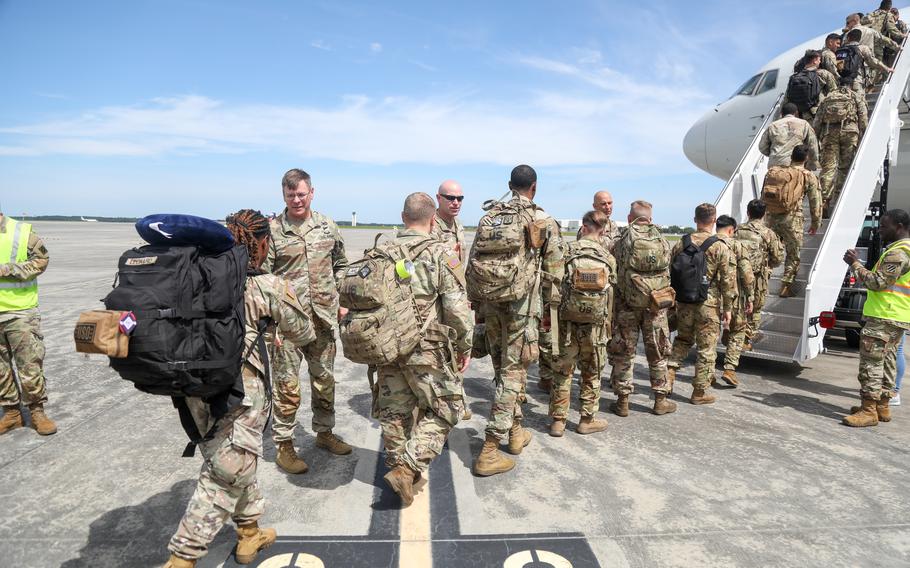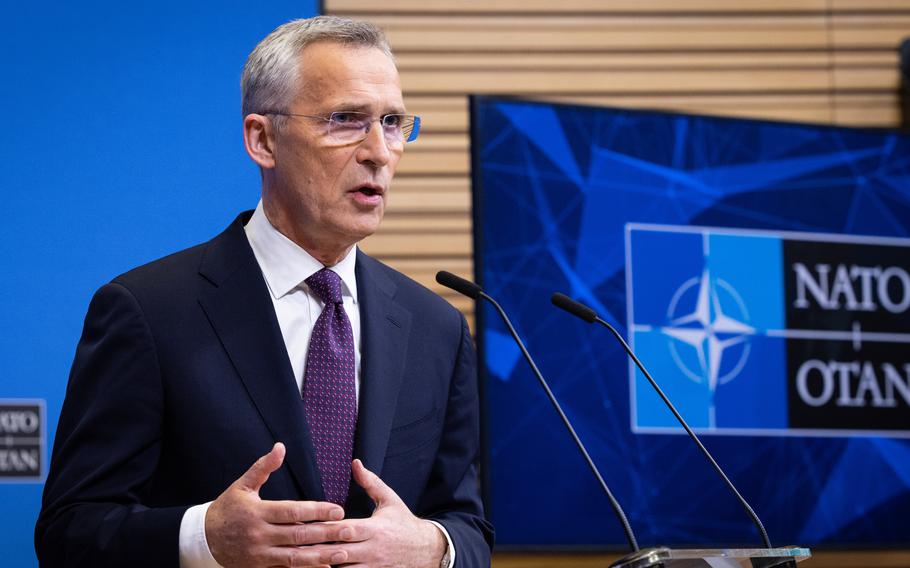
Soldiers of the 24th Ordnance Company board a flight to Europe from the Air Dominance Center in Savannah, Ga., June 12, 2023, to support operations along NATO’s eastern flank. New NATO defense plans require a force structure with over 300,000 allied troops at high readiness, NATO Secretary-General Jens Stoltenberg said Wednesday, June 14. (Jason Hull/U.S. Army)
NATO defense chiefs will put the final touches this week on a new Russia strategy and a plan to elevate Ukraine’s status with the alliance, Secretary-General Jens Stoltenberg said Wednesday.
Stoltenberg’s comments came on the eve of a two-day meeting among allies in Brussels, where Defense Secretary Lloyd Austin will hold a concurrent gathering of partners focused on supplying weaponry for Ukraine’s war effort against Russia.
The meetings in Brussels likely will be the last major gathering of top allied defense officials before a July summit in Vilnius, Lithuania, where President Joe Biden and world leaders will meet.
In Vilnius, allies “will send a strong message of support and solidarity with Ukraine and make sure clear that Ukraine's future is in NATO,” Stoltenberg told reporters.
Still, it remains unlikely that allies will take any concrete steps resulting in swift NATO entry for Ukraine, which requires unanimous support from the 31 members.
Numerous members, including Germany and France, long have been ambivalent about making Ukraine a NATO ally. If those objections to accession were overcome, the alliance’s requirements likely would mean that Ukraine would have to wait until the war with Russia is over.
Instead, allies are expected to agree on other steps forward, such as giving Ukraine a boost within NATO’s bureaucracy. Stoltenberg said allies are considering upgrading the NATO-Ukraine Commission to the level of “council.”

NATO Secretary-General Jens Stoltenberg speaks to reporters June 14, 2023, ahead of the meetings on Thursday and Friday of NATO defense ministers in Brussels. (NATO)
“If allies agree to establish a NATO council, that actually means that we will then be 32 equals. It will be the 31 allies and Ukraine sitting around the same table and at equal terms,” he said.
Meanwhile, defense ministers will focus on further strengthening NATO’s eastern flank with new regional plans to defend allied territory with more troops able to deploy on shorter notice.
“The regional plans require a new NATO force structure,” Stoltenberg said. “This will provide well over 300,000 troops at high readiness, backed by substantial air and naval power.”
The NATO gathering comes while Ukraine is in the early stages of a long-planned counteroffensive, which already brought some gains amid intense fighting and losses of various Western-supplied armored vehicles.
Given the scale of the Ukraine offensive against dug-in Russian lines and minefields, casualties are going to be inevitable, Stoltenberg said. Nonetheless, there are early hopeful signs of Ukraine regaining territory, he said.
“No one can today predict the developments on the battlefield. Wars are by nature unpredictable,” Stoltenberg said. “So therefore, it's impossible for anyone to say exactly what will happen in the next days or next weeks.”